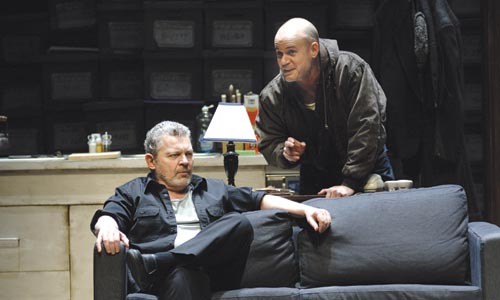With a running time of barely more than an hour, Caryl Churchill's A Number encompasses a number of themes stemming from the premise of human cloning.
On the most superficial level, the Pittsburgh Public Theater production is retro-futuristic sci-fi, wonderfully underlined onstage with a giant 1950s-era jumble of file boxes that resembles the old U.S. Patent Office and creates a claustrophobic setting for the two-man cast. From the program notes and the viewpoint of the central character, we see that cloning is merely the starting point for an exploration of identity. And judging by what plot there is, the 2002 play is a tale of horrific betrayal and revenge, with a sidebar on the futility of a "second chance."
The Public's promos reveal a good deal of the story, so I'm not giving away much by explaining that Salter had his only child cloned. At the beginning of the play, he is visibly and risibly nonplussed to discover long after the fact that the experiment produced "a number" of clones besides the now-adult Bernard. How many, we don't know till the end -- not that, ultimately, it's particularly important. But it distresses both father and son, who are wrapped up in the idea that identity stems from a bundle of DNA. Therefore, reasons Salter, copying that exact genetic code "damages your uniqueness."
A venal sort -- how venal we are yet to realize -- Salter mainly ponders the possibility of a lucrative lawsuit. Bernard, troubled to learn that he's "merely" a copy of someone else, cannot be consoled by his father's protestations of single-minded love. The prospect of an unknown quantity of doppelgangers lurking behind any given corner haunts the beleaguered Bernard. This is actually the least of his problems, given the reality of No. 1 son, a vaguely Matrix-y thug with a hard-edged take on the DNA-as-identity discussion.
OK -- as speculative/science fiction goes, this determinative interpretation of cloning is just so much twaddle, of which playwright Churchill assures us she is well aware in a neat dénouement. Salter's attempt at personal redemption is doomed long before the play ever begins, as it ends with yet another "son" subtly and simply illustrating the niceties of the interplay of nature and nurture in shaping identity.
The Public's production, directed by Jesse Berger, matches Churchill's verbal weight with visual strength via that scene design by Beowulf Boritt, and the lighting design by Scott Zielinski. It's a demanding play for the actors. In the pivotal role of the father, Sam Tsoutsouvas combines pain with power as Salter acknowledges his sin and realizes his folly. As the various sons, Craig Baldwin deftly switches from timidity to ferocity to normality, yet with a credible sense of fragility for each character.
In the end, A Number is less a play "about" identity or cloning or families, than it is a journey in the discussion about cloning, etc. Churchill ultimately upends everything she begins, and the Public takes us along for the ride.
A Number continues through April 6. Pittsburgh Public Theater at the O'Reilly Theater, 621 Penn Ave., Downtown. 412-316-1600 or www.ppt.org















